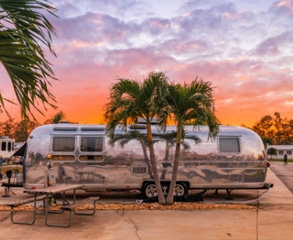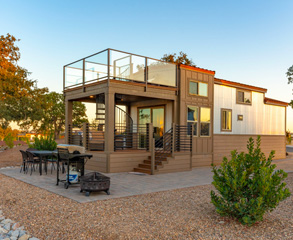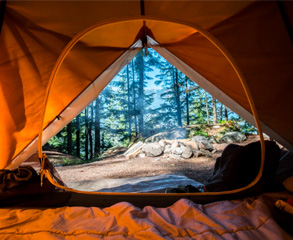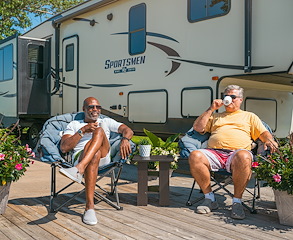One question we often receive is, "How do you save money on fuel while RVing?"
Although it may take a lot of power to haul a portable home, there are ways to reduce your fuel consumption. We've compiled 10 tips for increasing RV fuel efficiency that you can employ on your road trip. Check them out below before planning your next great getaway.
10 Tips to Save Fuel While RVing
1. Travel Slowly
The biggest change you can make to improve your RV fuel efficiency is to slow down. Drive the speed limit and don't try to shave off a few minutes by speeding.
Additionally, you can stay a little longer at each destination to save fuel. The more time you spend at each resort, the less money you'll spend on fuel. Plus, RVing is more fun when you travel at a leisurely pace.
2. Reduce the Weight
There's no getting around the fact that RVs are heavy. The extra weight takes a toll on fuel efficiency, so we recommend reducing your weight while traveling. Purchase firewood, propane, food, and water at your destination to keep the weight low while traveling.
3. Perform a Maintenance Check
Basic maintenance will help you improve your RV fuel efficiency. Before your first trip of the season, you should attend to the following items:
- Check tire pressure
- Test battery levels
- Inspect seams and seals for cracks
- Replace air filters, if dirty
- Test oxygen filters
You can check most of these maintenance items yourself. But if you're not comfortable doing so, RV maintenance shops perform routine inspections for low prices.
For more maintenance tips, check out our posts on RV maintenance in hot weather and preparing your RV for winter.
4. Limit the Air Conditioning
Air conditioning is a common culprit of poor gas mileage. Running the air conditioning system in an RV uses a great deal of fuel, especially at low speeds. Avoid using the air conditioning when possible by using only the fan.
Prop tip: driving with the windows open will also decrease your RV fuel efficiency. Stick with the fan at low speeds and use air conditioning on the highway only when necessary.
5. Maintain Your Speed
Stop, start, stop, start! We all know the horrors of driving a traffic jam, but traffic jams with an RV are even worse. You'll save fuel by maintaining your speed as much as possible. On the highway, you can use cruse control to maintain speed when safe to do so.
You should also avoid routes through cities when possible. These highways are often smaller and more congested. Look for bypass routes and beltways to avoid traffic jams in the heart of the city.
6. No Idling
You can maximize your RV fuel efficiency by minimizing idling. An RV wastes more than half a gallon of fuel for every hour it idles. See our above tips for avoiding traffic jams and always turn off your RV when you stop, even if it's just to get fast food.
7. Don't Drive in Windy Weather
When the wind starts blowing, your gas mileage will decrease. RVs are high-profile vehicles and it's easy to lose control of an RV in gusty winds. You'll remain safer and save fuel if you avoid driving on windy days, especially if you'd be driving against the wind.
8. Use GasBuddy to Check Prices
A great way to save money on fuel is by using GasBuddy, an app that tracks gas prices. You can look up nearby gas stations on GasBuddy to find the lowest prices on fuel. The app can also alert you if local stations start to increase prices, so you can fill up before prices jump.
9. Sign Up for Fuel Rewards Programs
Another way to use technology for saving money on fuel is by signing up for fuel rewards programs. Many gas stations offer rewards programs for customers to save a few cents per gallon. When filling a large vehicle like an RV, these savings can really add up.
In the U.S., Kroger and Shell have a partnership that allows Kroger customers to use their fuel points to save up to $0.10 per gallon on Shell gas. Additionally, Kroger customers can save up to $1 per gallon on gas at Kroger gas stations. Those are huge savings for RVers!
10. Bring Bicycles
An RV is great for covering distances, but motorhomes, SUVs, and pickup trucks are gas guzzlers. For short trips, bring bicycles with you while camping. You can use these recreationally, as well as for short trips to grab groceries and visit nearby destinations. Plus, bicycles are ideal for quickly moving around your RV resort.
11. Stay Longer
Travel and park your RV once and then come and go as you please during a seasonal stay at one of our resorts.
Next time you're traveling, save money and reduce your carbon footprint with these tips for improving RV fuel efficiency. If you know other campers who might benefit from these suggestions too, share this post and help them save fuel!
Related Posts









